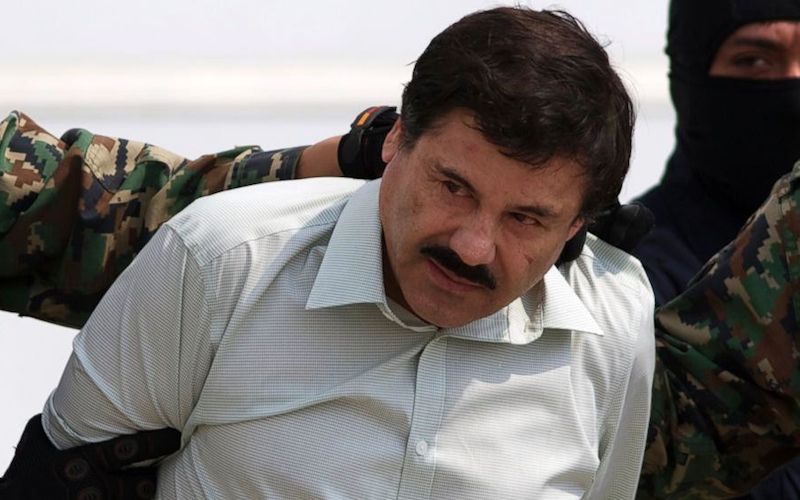
The Importance of Extraditing El Chapo
Mexico’s National Security Commissioner reported late last week that Joaquin “El Chapo” Guzman’s extradition to the U.S would likely take place in early 2017. This decision is long overdue. Although it will signal an end to the drug lord’s direct involvement in narco-trafficking and associated criminal activities, it is hardly an achievement of which the Mexican authorities can be proud.
The world famous drug lord, and head of the Sinaloa Cartel, is currently serving his sentence in a maximum security prison in Mexico. In the U.S he faces charges for drug trafficking, money laundering, kidnap and murder. These charges have been brought against him in multiple states including New York, California, Texas, Florida, New Hampshire and Illinois. In 2013 he was named “Public Enemy Number 1” in Chicago, the first such criminal since Al Capone. That same year Forbes included him on their list of “The World’s Most Powerful People,” estimating that his cartel profited $3 Billion annually. Needless to say, with the Sinaloa Cartel providing half of the United State’s supply of illegal drugs, a significant majority of this revenue comes directly from American buyers.
Clearly, the U.S has a strong incentive in bringing El Chapo stateside to be tried. However, these charges are not the only reason that both the U.S and Mexican authorities are eager to see him extradited. El Chapo’s recent history provides important context for understanding this impending extradition and why it is necessary.
The drug lord has had an almost legendary status in Mexico since escaping from prison in 2000 hidden inside a dirty laundry trolley. He had been caught fleeing through Guatemala in 1993, after narrowly avoiding assassination at the hands of a rival cartel (who mistakenly murdered Cardinal Juan Jesús Posadas Ocampo). Sentenced to twenty years behind bars, he carried out his Hollywood-esque escape after only seven years.
However, the mythology surrounding him is not just based upon his dramatic escapes. His elusiveness, and the “robin hood” quality that many perceive him to have, have helped forge a fascinating web of anecdotes, hearsay and conjecture around him (Malcom Beith’s 2010 The Last Narco is a compelling account of El Chapo’s life and recounts many of the stories that comprise the drug lord’s mythology).
El Chapo’s international reputation grew considerably after his 2014 re-capture, following 13 years on the run. When, in 2015, he escaped the maximum security Altiplano prison through a tunnel which had been dug underneath his cell’s shower, he once again drew the attention of the international media- including Sean Penn who conducted an interview with him for Rolling Stone magazine. Clearly, the fact that the star of Milk had managed to find El Chapo before the Mexican authorities was an embarrassment to the latter-alluding to both corruption and incompetence within the Mexican security services.
His third recapture earlier this year seems to have put an end to the farcical manhunt.
And yet, despite the fact he is once again incarcerated, it is unknown how much control El Chapo still exerts over the Sinaloa Cartel. Indeed, when he was incarcerated in 2014, it was assumed that he was still all but micro-managing the organization from the prison. In a country rife with corruption, this is not beyond belief. One popular theory even reasons that the drug lord’s 2014 recapture was entirely the staged result of a deal with the government. It does seem suspicious that a man who had successfully evaded the law for over a decade, and was rumored to have a vast security detail (one report claimed it was 800 men strong), was found with only his family and a single bodyguard.
However, Renato Sales Heredia, the Mexican National Security Commissioner, denies that El Chapo continues to run his business from his prison cell. Although in August three of El Chapo’s sons were kidnapped by a rival cartel, last month his sons were implicated in an attack on a military convoy that left four soldiers dead, and freed the captured “El Kevin” (an alleged Nephew of El Chapo). The two sons, Jesus Alfredo and Archivaldo Guzman Salazar, later wrote a letter to the local news distancing themselves from the incident.
Despite the National Security Commissioner’s statement, these events do not appear to be out of character with the rest of Mexico’s Narco conflict. That is to say, it seems to be business as usual for the Sinaloa Cartel, even with their leader behind bars.
Extraditing El Chapo would break any control he still has over the maintenance and future of his organization. This could be a purely symbolic achievement, or could significantly affect the balance of power within the Sinaloa Cartel and lead to infighting and splintering (he has led the Cartel with brutality, ambition and intelligence- characteristics that make him a very hard act to follow).Though there is no doubt that El Chapo does have influence in the U.S, he simply would be unable to operate as he has done in the past. Without the help of the systematic Mexican corruption which he has exploited so effectively, El Chapo will simply be out of the picture. Why was he therefore not extradited sooner? Complex legal proceedings no doubt account for some of this. However, the extradition process has also become a matter of national pride and political shame.
Providing a backdrop to El Chapo’s extradition is the 2009 arrest, and 2010 extradition of Jesús Vicente Zambada Niebla, aka “El Vicentillo.” The son of El Chapo’s right hand man, “El Mayo,” El Vicentillo made a deal with the U.S government, cutting his jail time in return for information about the inner workings of the Sinaloa Cartel. El Vicentillo is considered a top witness in the U.S case against El Chapo.
Extraditions have chipped the Mexican Government’s sense of national pride, particularly when considered within the age-old, dichotomous framework of Latin American sovereignty and self-governance contrasted with U.S paternalism. Continuing to extradite top criminals abroad does not reflect well on the Mexican authorities, as it highlights the failings of their own penal system in effectively keeping Narcos removed from criminal activity. By sending El Chapo to the US, Mexico is emphasizing its close degree of cooperation with the superpower, and an uncomfortable dependency upon its authority.
This decision has unquestionably been informed by the corruption throughout all levels of Mexican society. Through conceding to extradite El Chapo, the Peña Nieto Administration has signaled that it is not entirely confident that Mexico can indefinitely hold its most wanted man or prevent him from orchestrating the Sinaloa Cartel’s activities from behind bars. To add to this, the U.S Government would probably not be so insistent on extraditing the Drug Lord if they fully trusted the capability of the Mexican authorities in detaining and punishing him.
Regardless of how both the U.S and Mexican governments try and spin this extradition, it seems to show the lack of confidence that both governments have in the Mexican authorities. Mexico’s systemic corruption runs so deep that extraditing El Chapo seems to be the only choice that can be taken if he is to be truly brought to justice and removed from his criminal empire.
This article was originally posted in Pulsamérica.

